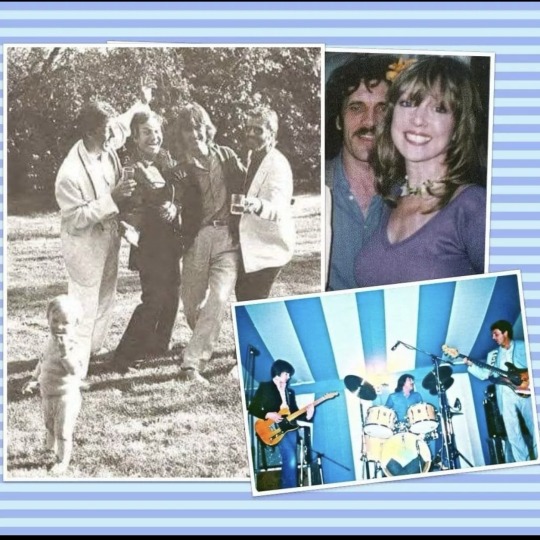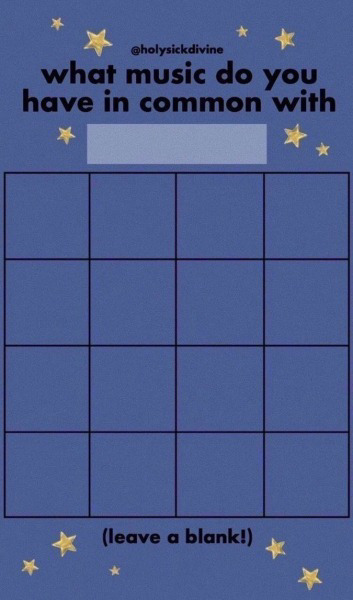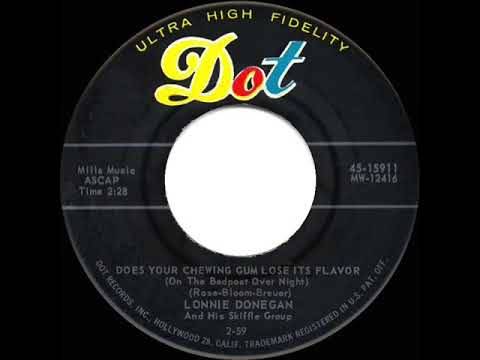#lonnie donegan
Text

James McCartney and Zak Starkey with Paul McCartney, Lonnie Donegan, George Harrison, Ringo Starr and Jim Capaldi at Hurtwood Edge, home of Eric and Pattie Boyd Clapton, to celebrate their wedding celebration on May 19, 1979⭐️⭐️⭐️
Via @thebeatleschildren on Instagram🌸
#60s icons#girlsofthesixties#60s models#the beatles wives#pattie boyd#eric clapton#wedding celebration#paul mccartney#ringo starr#george harrison#jim capaldi#lonnie donegan#james mccartney#zak starkey#1979
10 notes
·
View notes
Text
11 November 1956
A young Paul McCartney sees skiffle legend Lonnie Donegan play in Liverpool.

If I were being dramatic, I could say that there would be no Beatles if Donegan hadn't inspired McCartney to learn guitar.
23 notes
·
View notes
Text
The Fete
youtube
youtube
The earliest recording we have of John singing. Not strictly a Beatles recording, but it's certainly relevant.
This was recorded at Woolton Garden Fete on the day John and Paul officially met for the first time. (There are tantalizing hints that it wasn't the first time they met, but that's for another blog).
John was 16 when this was recorded.
Also performing with him were
Eric Griffiths - Guitar
Colin Hanton - Drums
Rod Davies - Banjo
Pete Shotton - Washboard
Len Gary - Tea Chest Bass
It's very cool to have any recording from that day and is pretty much a fluke that a fan would bring a recording device at all. They weren't exactly small.
Apparently, the entire set was recorded, but hasn't been released. Maybe it will be in the future. Who knows.
Here are the songs he's covering, if you haven't heard them:
youtube
It was recorded in 1926, but the most famous version was
youtube
As you can see, John changed it quite a lot. He made it more rock and gave it that Lennon flare. The Quarrymen would have absolutely rather done that version as seen here
youtube
but John was going to make it Rock n' Roll anyway.
youtube
This is Elvis' version of the second song. It's not originally Elvis of course, but this is what John was probably basing his version on.
This is the original
youtube
To be honest, John's version doesn't sound like either of these. As usual, John added his own thing and made the song all his own.
#1957#6th July#putting on the style#vernon dalhart#lonnie donegan#baby let's play house#elvis presley#arthur gunter#john lennon#eric griffiths#colin hanton#rod davies#pete shotton#len garry#the beatles
87 notes
·
View notes
Text
Group Stage - Day 1: Group D
The UK Rock Superstars tournament will determine the greatest UK rock act of all time via Tumblr polls. The first place finisher in each group will automatically advance to the final knockout bracket, but any other rock act can advance to the stage based on the percentage of votes they receive in the group stage. Choose wisely!
2 notes
·
View notes
Video
youtube
LECTURE 4: INFLUENCES (PART 1): Lonnie Donegan’s “Rock Island Line” (1954) launched the British Skiffle Craze that lasted from roughly 1954 to 1959. The craze reached its peak in 1957-58, when some 30,000 Skiffle bands existed throughout the UK. The song “Rock Island Line” was originally written by African-American songwriter Clarence Wilson (based on an old spiritual hymn) and first performed by prisoners in Arkansas in 1934 (and recorded by legendary musicologist Alan Lomax). Next came a recording by Blues/Folk political balladeer/singer LEAD BELLY (Huddie William Ledbetter). Finally, Lonnie Donegan’s version became the most famous, thanks to the massive Skiffle movement it inspired. Donegan played in several jazz bands before becoming a Skiffle superstar. He loved American Blues and Folk music, and took the name “Lonnie” from Blues great Lonnie Johnson (Donegan’s real name was Anthony James Donegan, and he lived from 1931 to 2002).
#Lonnie Donegan#skiffle#Lead Belly#Alan Lomax#Blues#Clarence Wilson#British skiffle craze#Rock Island Line#1950s#1960s#American music#Folk music
3 notes
·
View notes
Photo



Tagged by @nat-20s! (Louie Zong is especially high on the list, after I finished listening to Boss Rush, Tales from the Disc, and Business! today)
Anyway I’ll go ahead and tag @nat-20s back, as well as....
@overnightshipping @savefrog @slygirlboy @aiagob @auttoton @gigabytetroubadour
#I tried getting a good blend of obscure and normie#but apologies if I got the balance wrong#taggitytagtag#felice brothers#keith mansfield#talking heads#penguin cafe orchestra#louis prima#weird al#mountain goats#loudon wainwright iii#devo#the kinks#jack stauber#lonnie donegan#british sea power#sea power#the pogues#wilco#air#They're all bands that mean a Lotte to me!
2 notes
·
View notes
Photo

Lonnie Donegan † November 3, 2002
5 notes
·
View notes
Video
youtube
Lecture 8: Before the arrival of The Beatles and the start of the British Invasion, “skiffle king” Lonnie Donegan (born Anthony James Donegan) was one of the biggest British stars on both sides of the Atlantic, beloved in both England and North America. In this 1961 television footage, Donegan performs a traditional American blues song, “Rock Island Line,” first popularized in the 1930s. He turned the song into a major hit, and became the envy of youthful musicians across the United Kingdom. His unique voice and visible passion for folk music dovetailed well with the folk music revival in the United States.
#The British Invasion#Lonnie Donegan#Skiffle#folk music#folk music revival#1950s#1960s#Rock Island Line#1961
3 notes
·
View notes
Text
Week ending: 15th May
Four songs! It's been a while! And all four of these are pleasingly varied, as a bonus - a sort of sample platter of different stuff that was going on in 1958, from the mainstream to the less mainstream, to the "wait, how did this chart, again?"
Wear My Ring Around Your Neck - Elvis Presley (peaked at Number 3)
No, I also do not know why the ring isn't around your finger. That seems like the obvious place to want somebody to wear your ring. But this song, nevertheless, is all about how much Elvis wants his love to wear his ring around their neck, as an engagement gift: Won't you wear my ring around your neck / To tell the world I'm your, by heck!
No, I didn't invent that slightly awkward "by heck", Elvis really is here mincing his oaths like somebody's grandmother. It's quaint, by modern standards, wholesome, but very much a product of its era. Similarly, the focus on getting engaged and married also feels like a slightly old-fashioned thing, and lines about how They say that goin' steady is not the proper thing / They say that we're too young to know the meaning of a ring feel like they're offering a glimpse into a social issue that we just don't have today. Apprently there was some concern in the 1950s about teenagers jumping too soon into getting engaged? Whereas I feel like nowadays, marriage is more of an afterthought, or is just a little less central of a goal for a relationship - certainly, we've not got songs about getting married young, in quite the same way.
As songs go, it's fine, with lots of guitar, piano and hand claps, which really seem to be shaping up as the sound of 1958. I don't know how many songs this year have involved clapping, but I feel like I've been mentioning it every other week. Which isn't a problem at all, I feel like there are very few songs that aren't livened up by a bit of clapping. And overall, here, the pace and energy does keep things fresh. Elvis and his backing singers are on fine form, and just in general, it's a perfectly enjoyable song. Maybe a little repetitive - I keep thinking it's finished and then there's another chorus! - but it doesn't drag, or get boring. So yeah, decent.
Tom Hark - Elias and His Zig-Zag Jive Flutes (2)
With a group name like this, you know you're in for something special, and so it was with a certain excitement that I hit play on this song, which I was pretty sure was fairly obscure. And we start, intriguingly, with a spoken section, men speaking in a south African language, money clattering onto a table and then suddenly pennywhistles, multiple, playing - wait a minute, don't I know this?
It turns out Tom Hark is a song with an improbably impressive afterlife. It started out as a South African kwela tune, kwela being a genre of street music, played mostly on pennywhistles, with jazz and skiffle influences, that developed in the 1950s. A certain Jack Lerole and his brother Elias made this particular version popular, and were playing in on the streets of Johannesburg when a record producer approached them about making it into a record, which then became a hit outside of South Africa when it was used in a 1958 BBC programme called The Killing Stones, all about diamond smuggling in South Africa, at which point a whole bunch of people seem to have covered it. Then, rather improbably, it was covered in 1980 by a ska punk band called the Piranhas, and from there it was picked up as a football chant, popular to the point where even I - somebody who has absolutely no interest in following football - instinctively knew the tune of this from I guess the school playground? Honestly, I have genuinely no idea where I learnt the Tom Hark tune, but it's a really simple, catchy one, and probably easy to fit lyrics to, so I can kind of see why it works. But yeah, I challenge you to name a less probable hit song!
I like it a lot. There's a cheeriness, the same sort of DIY vibe that you get with some skiffe songs, and like I said, it's simple, a sort of freewheeling tune that sounds particularly carefree and bright. There's something a bit cacophonic about all the penny whistles, which are played breathily, and it's got a sort of rough-around-the-edges charm to it all, held together as it is by a strummed guitar and sheer enthusiasm. It's exciting, possibly just because it's so different to just about everything else out there.
Amazingly, it wasn't even that bit a hit in South Africa itself. Jack Lerole, the brains behind the operation, seems to have gone on to have a fairly extensive musical career, but none of the musicians on the record were really remunerated for this hit, which is bizarre to me, given the success it's clearly gone on to have!
And yes, in case you were wondering, Tom Hark isn't a person. It's apparently a corruption of "tomahawk", the name chosen for the tomahawks that the Lerole brothers would carry around the streets of Johannesburg to protect themselves. The more you know!
Grand Coulee Dam - Lonnie Donegan (6)
And then, from the mean streets of Johannesburg, we're transported to the wilds of Washington state, with a song about the Grand Coulee Dam, a 1930s hydroelectric project on the Columbia River. If this strikes you as an unlikely subject for a song, you're not wrong, and the story of how it happened is kind of fascinating.
The song was originally written by Woody Guthrie in 1941. The dam, at this point, had been in construction for almost a decade, and was almost finished. And it had been pretty controversial, with various locals fighting for a lower dam. So when Woody arrives, he's hired by the local Bonneville Power Administration to write propaganda songs about the whole Columbia River for a documentary that was supposed to drum up support for greater federal regulation of hydropower, showing the benefits of hydroelectric dams more generally. Woody thus arrives, spends by all accounts quite a productive month travelling around and writing songs, inspired by the beautiful setting, only for the documentary to get delayed by World War II. In the end, Woody writes 17 songs, which is still a lot of songs to write about one river, but less than the proposed 26, and none of them see the light of day until 1949, well after the war is done.
Despite this, the song's lyrics definitely hint at World War II, or at least at the sort of patriotic context that Woody was writing in. It's never explicitly stated, after all, but this is a song that just drips in American pride, even from the opening lines, as the narrator sings about how a new wonder of the world now exists in Uncle Sam's fair land.
America, throughout, is a beautiful, wild country, and the song's depiction of nature is genuinely really beautiful. It's not overblown or overly sentimental, but there's something lovely in the description of how the Columbia River heads up the Canadian Rockies / Where the rippling waters glide, / Comes a-roaring down the canyon / For to meet that salty tide, or in the lines about the misty crystal glitter / Of the wild and windward spray.
It's the land that Woody loves the best, and he treats it with a real affection, but he never slips into pining after some idealised, unspoilt verison of it. This song is supposed to be propaganda for hydroelectric power, after all, and so we instead get a song that respects nature but also shows how dangerous it can be, describing how the Columbia River breaks up boats and kills sailors, leading them to dream of a dam. And finally, in 1933, it happens: Now Uncle Sam took up the challenge / In the year of thirty three / For the farmer and the factory / And all of you and me. Taming nature becomes a heroic act, a feat of modern engineering.
It's a decidedly gritty, industrial vision of America, with raw, hard work centred throughout . Even the river becomes a labourer, in the song, as the dam-builder declares river, while you're rambling / You can do some work for me. And so we finish up with a verse about everything that the newly dammed river can power, how now from Washington and Oregon / You can hear the factories hum / Making chrome and making manganese / And white aluminum. It's odd, in a way - I certainly can't think off the top of my head of any other song singing the praises of chrome and manganese - and it's very much a product of its 1940s origins, with other lines nodding to how planes built in the Pacific Northwest went on to be instrumental in the US war effort. There's a subtle recognition, in all this, at the contributions of the American working class, and the respect due to them - it's not bashing you over the head with it, but the love and pride for a decidedly non-glamourous part of the America is absolutely part of the song's appeal, at least for me.
So yeah, the song came out in 1949, and while it wasn't ever quite forgotten, it sounds like it was kept in the public consciousness thanks in no small part to Lonnie's cover, here. It's not a completely wild thing for him to have covered - he's always favoured American folk songs, but for Lonnie, a 1950s Glaswegian, to cover a song so rooted in one very specific American historical and regional context is still pretty odd, the more you think about it. Either way, Lonnie does do a good job. It's more of a narrative, lyric-focussed song than he usually goes for, and he sings it compellingly, painting this interesting, nuanced portrait of a dam that most British listeners have absolutely no reason to care about. But yeah, I think most of the reason this works is Woody Guthrie's writing, which is folksy and idealistic and just scratches a very specific itch. Good stuff!
Lollipop - The Mudlarks (2)
And so, finally, a British cover of an American song we've only just heard. I liked the Chordettes' version of this song, and to be honest, this version isn't very different, so a lot of the thigns I said then hold true here, too. It's a fun bit of throwaway catchiness, and as such, pretty enjoyable.
I have to say, I do think that this version isn't quite as good as the Chordettes', for a few key reasons. I liked the a cappella bits of the Chordettes' version, for example, with all the hand claps. Here, you don't get that, just a much heavier instrumental backing. Plus, the harmonies here are just that little bit less crisp, less complex. And worst of all, it's gone from being an all-female ensemble to a mixed one. One of the things I really liked about the Chordettes was their "girls giggling about boys" energy, and having men joining in loses some of that. Which is a shame, we really haven't had enough "girl groups" yet!
On the plus side, there is something very cool about the effects that the Mudlarks have included here, including a sort of echoey, layered effect on the introduction. It's delightfully trippy, and just that little bit weird - it's a subtle thing, but it's the sort of studio trick that we're hopefully going to see more and more of, going forward. They've kepy the "pop" sound, too, which is absolutely the correct decision, a real memorable bit of silliness.
On a side note, I was also charmed to find out that the Mudlarks, aside from having an excellent name, were a vocal group who originally became successful while they were all still working at a Luxton Vauxhall factory, and just sang in their breaks and off-time. What a fun origin story!
I feel like weeks like this are the best kind of week on this project. We had four songs, a mix of different origins, styles and vibes. We've had rock and roll from Elvis, the biggest star out there at this point, a bizarrely unlikely South African song that has since become a British football chant, a Glaswegian skiffle cover of a 1940s wartime propaganda song about a specific American hydroelectric dam, and a British knock-off cover of a particularly daft American bit of girl-group a cappella fluff. And literally all of it was entirely listenable. Two of the songs were definitely more interesting to me, though, and it'll be hard to decide between them. I think at the end of the day, Tom Hark is more interesting, and mjusically more significant, but if you have to pick one I enjoyed more, just on a gut level, it's probably Lonnie. Sorry!
Favourite song of the bunch: Grand Coulee Dam
0 notes
Text
Soccer Songs! (Football heaven!)
A big weekend for English Football fans!
With England in the final of the European Football Cup in Germany, Nick Hennegan looks back at 60 years of Football songs and the drama and excitement shared by millions. Not just in England!
Photo by Simon Gough on Pexels.com
#England#European Cup final#Football#Germany#Its coming home#London#Lonnie Donegan#music#New Order#pubs#singers#songs#theatre
0 notes
Text

DREW LONNIE DONEGAN AND LES BENNETTS... because I'm obsessed with them. Bottom pic is the reference I screenshotted off of a video(:

0 notes
Text

Skiffle.
1 note
·
View note
Text

#Lonnie Donegan#music#microphone#vintage#photography#art#black and white#skiffle#Scottish#smile#men's hair
1 note
·
View note
Text
A Quick Nod to Lonnie Donegan
There are some changes happening at my blog. I started this blog way back in the mid aughts—just about twenty years ago. A lot has changed in my life since that time but there’s one constant: music appreciation. My passion for supporting independent musicians and live music remains steadfast.
I started my life as a devoted music fan around age 6. I don’t have many recollections of being…

View On WordPress
0 notes
Text

On television's Juke Box Jury, Lonnie Donegan (of all people!) insulted us and spat on the floor, complaining that we were exploiting blues artists and making money out of them. There was a flood of protests, but none more forcibly and accurately expressed than in a letter to Record Mirror by John Berry:
"Although not interested in the recent beat boom, I was glad the Stones made it. I've been a blues fan since before the skiffle days. The Stones are very serious about the blues and have done it and its exponents a lot of good - more than can be said for the skiffle craze. As for saying that the Stones are exploiting blues artists and making money out of it, Mr. Donegan has got things the wrong way round. When the Stones record a number by a blues artist, the credit is given to him and he gets the royalties. They also seize every chance to make these artists more known here. In Mr. Donegan's day, the idea was to take a song of an obscure artist, adapt it to skiffle and record it as 'Trad., arr. Donegan' or whatever name was involved. Surely, that's nearer 'exploitation.'" Ouch!
excerpt from Bill Wyman's memoir, Stone Alone

#the rolling stones#juke box jury#lonnie donegan#blues music#blues rock#skiffle#cultural appropriation#exploitation#60s music#60s rock#feud#fun fact: Howlin' Wolf was on that episode of Juke Box Jury as the mystery guest
1 note
·
View note
Photo

Lonnie Donegan: My Old Man’s A Dustman
Hallmark Marble Arch HMA 204
Released: 1973
1 note
·
View note